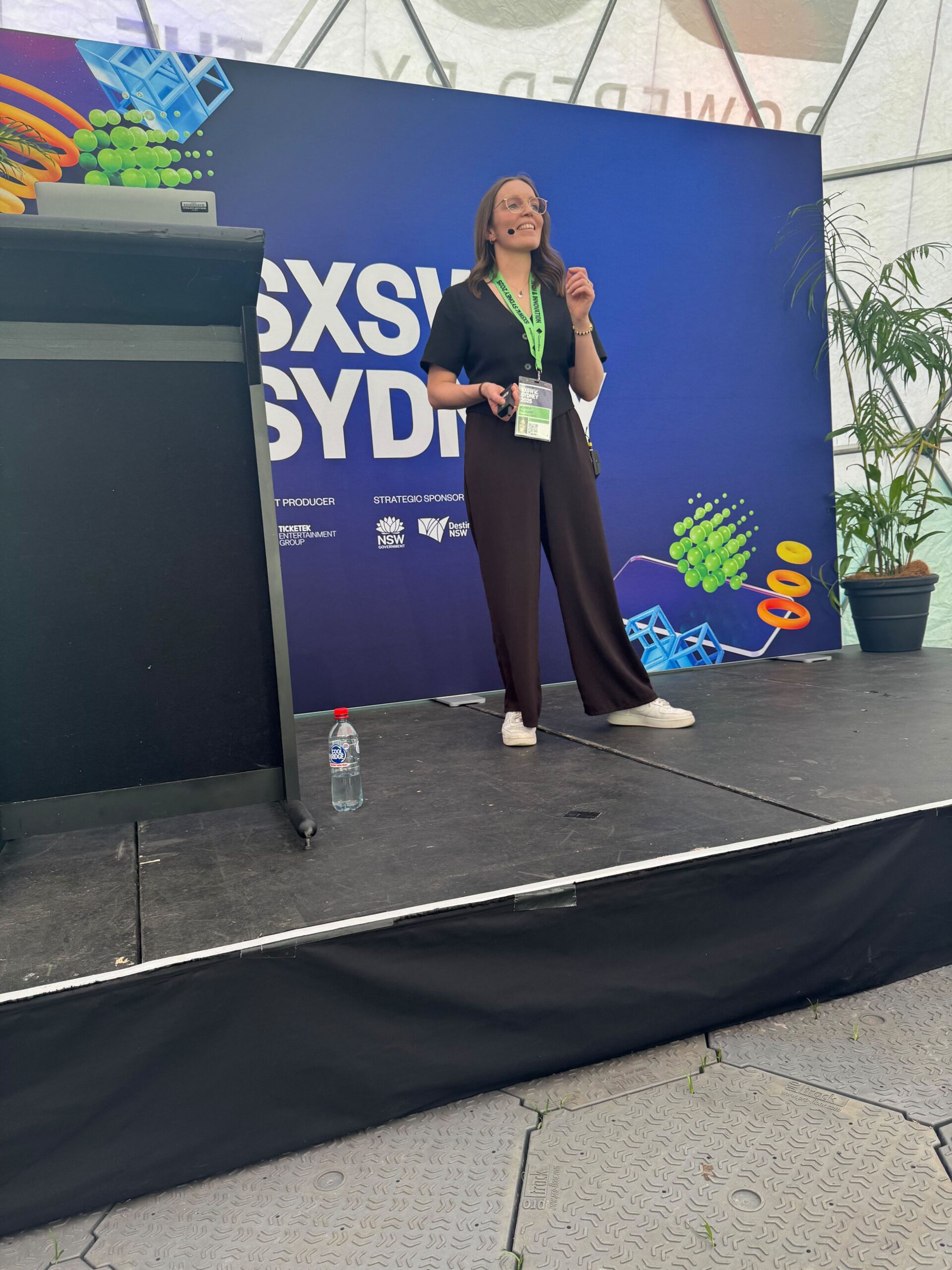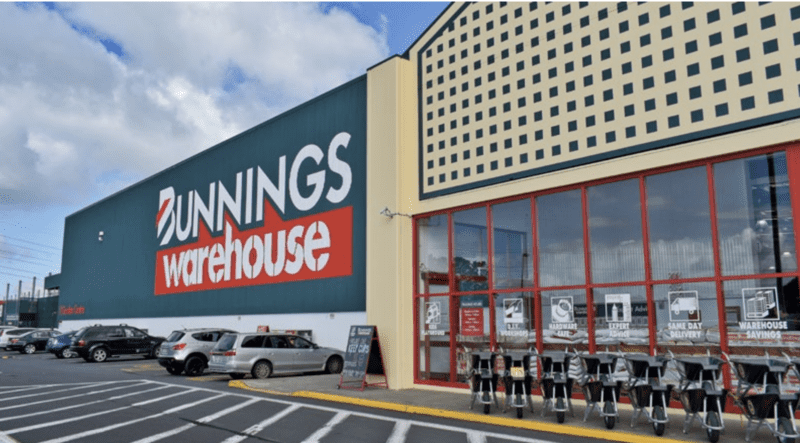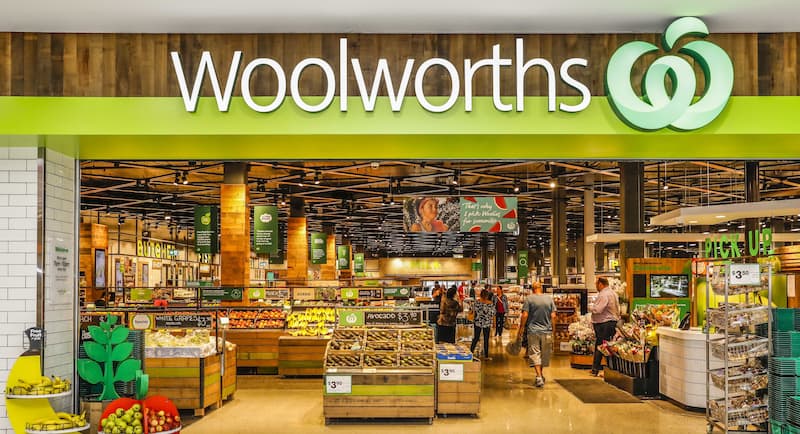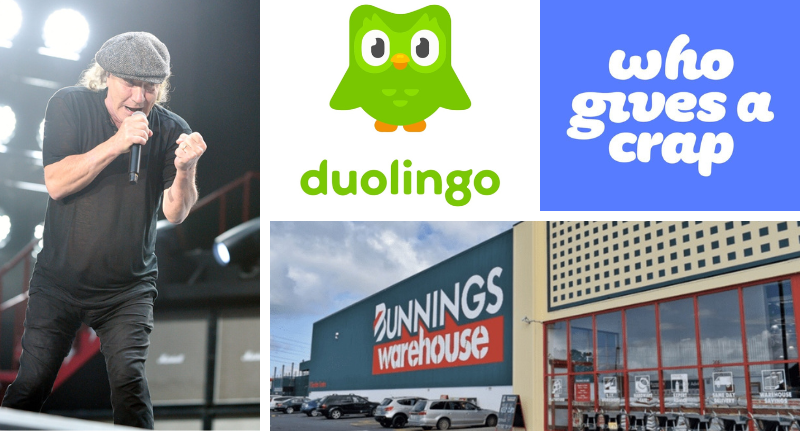At a time when Australians have lost faith in many institutions, from politics to big business, marketers are rethinking what customer loyalty really means, and how it can be achieved.
At South by Southwest Sydney, Jessica Folkard, Senior Manager, Audience Intelligence at The Growth Distillery, shared fresh insight into how brands can build genuine customer loyalty in her session, The Formula for Faith: Why Giving Is Good For You.
“We’re living in a crisis of grievance,” Folkard said. “Two-thirds of Australians feel let down by institutions because they believe those institutions are self-serving.”
Drawing on a report built from a range of studies and sources, Folkard noted that seven in ten Australians now trust institutions less than they did a decade ago, a decline that extends well beyond politics and into everyday life.
Her opening question to the audience, “Have you ever unfollowed a celebrity you still liked because they said something that didn’t feel right?”, instantly set the tone for a discussion on the fragility of modern trust.
“This is a human problem,” said Folkard. “It affects every relationship, between leaders and employees, brands and audiences, creators and followers.”
One tweet, one statement, one perceived mis-step can trigger mass unfollows or backlash.

Jessica Folkard
Folkard argued that brands now live in that same economy of trust. “We don’t just unfollow celebrities anymore,” she said. “We unfollow brands, ideas, and even institutions that no longer feel aligned with who we are.”
A recent study from UTS said 96 per cent of Australians think that brands should be doing some form of good in the world, but this has to be authentic and not traditional corporate responsibility or cupcakes for staff on International Women’s Day.
“It’s faith,” she said. “Faith is a person’s unwavering belief that another person, another brand, or another organisation, will act with their best interest at heart and basically they will act with integrity.”
Folkard gave the great example of how faith can affect the way we shop at supermarkets for groceries. Even though cost should be a priority at the moment, as food is expensive, our faith in the supermarket does come into play.
“We’ve studied this quite extensively,” she said. “Loyalty is something that’s not strong in this sector. Three in five Australians are willing to change their main supermarket if it doesn’t do a good job at meeting personal values.”
This presents a huge opportunity for the supermarket industry, because, as studies have found, we are more likely to forgive a brand if we feel loyal to it.“The power that faith generates when you give with generosity is huge,” she said.
The four pathways of generosity
Folkard then introduced a model designed to help brands navigate this. To build loyalty and faith, brands must be seen to be generous.
This is not just in their pricing or what they offer, but how they interact with their customers, staff and the wider community. She gave four examples of the four pathways to being generous, and revealed how these brands have got it right.
Path One
Giving knowledge: Empowering people through insight and education.
Example: Duolingo the language learning app gives language lessons freely, so you can learn before you’re asked to pay. This builds loyalty to the brand as you learn with them, making them the number one learning app in the world.
Path two
Giving access: Creating opportunities people couldn’t otherwise reach.
Example: AC/DC’s fairly priced farewell tour kept tickets accessible for fans while similar acts charged double or triple the price. The band gain the benefit of being seen as loyal to their fans.
Path three
Giving resources: Building purpose into profit.
Example: Who Gives a Crap, the toilet paper company, doesn’t just donate profits to developing nations to build toilets, the whole company is built around giving. “Donating isn’t something they do once they make their profit, they earn their profit through the fact they give,” said Folkard.
Path four
Giving time: Being physically and emotionally present in communities.
Example: Bunnings’ weekend sausage sizzles are a case study in how corporate presence can become social glue as groups and charities line up to raise money through serving the community and selling a sausage in a roll at their local Bunnings. “Bunnings is consistently voted
the number one most trusted brand in Australia,” said Folkard. “So this is obviously working for them.”

When generosity backfires…
It’s important to note that not every act of “giving” is seen as generous. Folkard warned that brands can lose credibility fast when their actions, or even their associations, contradict their values.
Goop, the wellness brand fronted by Gwyneth Paltrow, was cited as an example of giving knowledge but trust is lost when it isn’t grounded in evidence.
Paltrow built the Goop empire as a gateway to health advice and products, but much of its content has been criticised by medical experts for promoting unverified or pseudoscientific claims. “When what you give is questionable, you don’t build trust, you erode it,” Folkard said. “It’s a reminder that generosity without credibility can backfire.”
Woolworths was used to illustrate what happens when access, one of the four pathways of generosity, is given or taken away without alignment to brand purpose.
Its recent decision to remove Australia Day merchandise from shelves was positioned as an act of social sensitivity by the brand, but Folkard noted it sparked backlash from customers who felt excluded rather than included.
“The supermarket did not field the right to be the authority on that issue,” said Folkard. “And people were outraged. Their brand is built off an ethos of freshness, convenience and value, not social commentary.”

The discussion around Katy Perry revealed how misalignment can show up in culture as well as commerce.
Her global empowerment anthem Woman’s World lost impact when fans discovered it was produced by Dr Luke, a man accused of sexual assault. “It’s not enough to say the right thing,” Folkard said. “Who you work with, where you spend, and what you endorse all tell the real story.”
Finally, she outlined the case of Kyte Baby, a “for parents, by parents” brand for young children that refused a staff member’s request to work remotely while her newborn child was in intensive care.
The story went viral, with customers accusing the company of hypocrisy. “They’d built their entire identity around empathy for parents,” Folkard said. “But when tested, that empathy wasn’t shown and the betrayal felt personal.”
These examples, she said, share a common thread: misalignment between intent and action.
“Generosity isn’t performative,” Folkard concluded. “It’s not a campaign. It’s what you do when no one’s watching. Credibility can’t be claimed, it must be earned,” she said. “And once it’s lost, it’s incredibly hard to rebuild.”
After her SXSW session, Mediaweek sat down with Folkard to expand on her session and ask how likely it is for brand’s to turn the tide of public opinion in an age of social media.
“Some people will always forgive, convenience wins them back,” she said. “But for others, once the trust is broken, it’s gone until the brand makes real amends. You can’t PR your way out of that.”
Even amid cost-of-living pressures, she said values still matter.
“Price is the number-one driver when we choose some brands, but it’s not the only one. People still want to feel good about what they buy.”
She also noted how quickly competitors can seize opportunity when others fail. When Kyte Baby were being vilified for refusing a team member time out of the office with her baby, similar brands jumped in with empathy and won customers in the process.
Her final advice for marketers confronting backlash was clear, “Apologise quickly, apologise sincerely, and make it right, directly and tangibly. That action will speak louder than any campaign line.”

